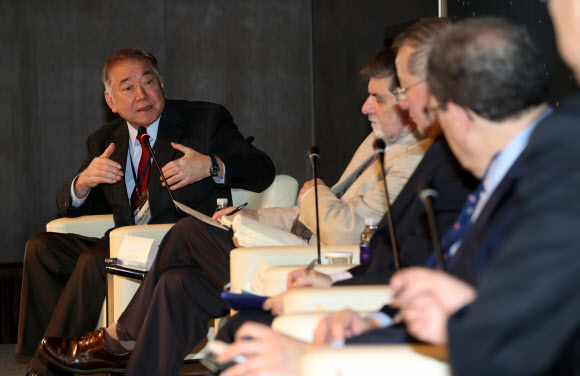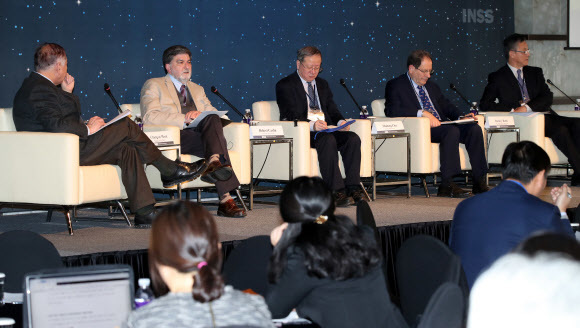 |
|
Moon Chung-in, the South Korean president’s special advisor for unification, foreign affairs and national security, speaks during an international conference on the Korean Peninsula after denuclearization organized by the Institute for National Security Strategy (INSS) at the Plaza Hotel in Seoul on Dec. 10. (Yonhap News)
|
INSS holds conference on Korean Peninsula after denuclearization
Moon Chung-in, the South Korean president’s special advisor for unification, foreign affairs and national security, said that the possibility of North Korean leader Kim Jong-un visiting Seoul in late 2018 or early 2019 will depend on how North Korea-US relations go.
“Whatever direction this goes, I regard it as playing a supplementary role and being part of a virtuous cycle, so we don’t need to place too much weight on [the timing of Kim’s reciprocal visit],” Moon said during an international conference on the topic of the Korean Peninsula after denuclearization that was organized by the Institute for National Security Strategy (INSS) at the Plaza Hotel in Seoul on the afternoon of Dec. 10.
 |
|
Pictured from the left are Moon Chung-in, the South Korean president’s special advisor for unification, foreign affairs and national security; Robert Carlin, a visiting researcher at the Center for International Security and Cooperation in the United States (CISAS) at Stanford University; Chu Shulong, a professor at Tsinghua University; Stanley Roth, former US Assistant Secretary of State for East Asian and Pacific Affairs; and Yang Xiyu, a senior fellow at the China Institute of International Studies (CIIS). (Yonhap News)
|
Kim’s Seoul visit to depend on NK-US relations
“Kim Jong-un paying a reciprocal visit to Seoul is the decision of the century. Since the North Korean leader has never visited South Korea since the peninsula’s division in 1945, his visit would be a groundbreaking event that would have major ramifications for inter-Korean relations that go beyond denuclearization and a peace regime,” Moon said.
“Our original idea was for North Korea and the US to hold their second summit and then if that was a success to have the three leaders make some kind of end-of-war declaration and at the same time push for denuclearization and a peace treaty. We thought that the ideal sequence would be for [Kim] to pay a reciprocal visit to Seoul after that,” Moon said.
But with North Korea-US relations remaining at an impasse, Moon Chung-in said, South Korean President Moon Jae-in’s push for a fourth inter-Korean summit could itself serve to sustain the virtuous cycle. “On a personal level, I think that it would be helpful for Kim to decide to visit Seoul.”
Other experts who participated in the conference on Monday voiced a negative view about Kim visiting this year. “The more important question [than the schedule of Kim’s visit] is why he’s hesitating,” said Robert Carlin, former chief of the Northeast Asia Division at the US State Department’s Bureau of Intelligence and Research and currently a visiting researcher at the Center for International Security and Cooperation in the United States (CISAS) at Stanford University.
US’ “simple roadmap” is “old-fashioned” and unacceptable to N. Korea
“[North Korea and the US] don’t seem to have found a compromise yet on their approach [to negotiations about denuclearization and normalizing relations],” said Yang Xiyu, a senior fellow at the China Institute of International Studies (CIIS) who formerly served as the deputy head of China’s delegation to the Six-Party Talks.
Yang asserted that the US’ “simple roadmap” to denuclearization, which “consists of denuclearization, verification and dismantlement,” is an “old-fashioned method” that’s unacceptable to North Korea. Yang added that North Korea’s conditional proposal to permanently dismantle its Yongbyon nuclear facility was “a very revolutionary symbol and that it would be “fair to offer corresponding measures in the process of dismantling and verifying this key facility and moving on to another facility.”
Chu Shulong, a professor at Tsinghua University, addressed the sequence of denuclearization and the initial phase of normalizing relations, a matter about which North Korea and the US have failed to narrow their differences. “There has to be action before trust can be established,” Chu said, while emphasizing that North Korea’s suspension of nuclear tests for 12 months is “a genuine act of denuclearization.” Chu asserted that the US and the international community ought to provide rewards for various actions by North Korea, including its demolition of the Punggye
Village site.
”We’ll need a little trust”
On the other hand, Stanley Roth, former US Assistant Secretary of State for East Asian and Pacific Affairs, said that “We’ll need a little trust when it comes to North Korea. We want denuclearization, but the complete denuclearization of North Korea isn’t going to happen.”
Roth also addressed the continuing presence of US troops in South Korea in the hypothetical scenario in which denuclearization has occurred and North Korea-US relations have been normalized. “While this wouldn’t mean a complete withdrawal, it would inevitably lead to changes in the type of the alliance and military readiness in various situations.”
US analysts were in agreement about the need for working-level talks between North Korea and the US in order to discuss all these matters. In regard to the recent delay of all high-level and working-level talks between North Korea and the US, Moon Chung-in said, “[The Americans] have called Choi Son-hui and Kim Yong-chol dozens of times, but they haven’t gotten a response from Pyongyang. They’re also talking on the New York channel but aren’t making any progress.”
End-of-war declaration will convince NK public to focus on economic development
Yang argued that the end-of-war declaration, which had once been a major point of contention in the North Korea-US negotiations, “is important in terms of North Korean domestic politics.”
“After an end-of-war declaration is made, the North Korean [leadership] can also convince the public and their generals that it’s okay to focus on economic development since the war has been declared over. That’s the only way to start the Yongbyon nuclear negotiations,” Yang said.
While the US and Chinese experts who participated in the conference were in agreement that this is a “historical moment” in North Korea-US relations and in international and peninsular affairs, they also expressed concerns about the ongoing deadlock.
“There may not be adequate momentum [to propel North Korea-US relations] through the middle of next year. This process could move backward. We need to redouble our efforts so that the momentum can continue,” Carlin said
“This isn’t enough, and that’s putting it politely. We need more action through confidence-building between North Korea and the US. Concrete steps need to be taken to make confidence-building possible,” Chu said.
By Kim Ji-eun, staff reporter
Please direct comments or questions to [english@hani.co.kr]










